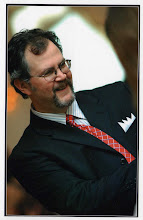Tuesday, January 24, 2006
NJJN Sports: Out to launch
January 24, 2006 -- After writing sports pieces on and off for the New Jersey Jewish News since I became a full-time writer in June 2004, the paper decided to find a home for them. Ladies and gentleman, may I introduce to you NJJN Sports.
It's amazing the sense of accomplishment -- not to mention power -- one gets when given his own project. I get to introduce myself as "sports editor." The title opens many doors and gives a certain amount of cache.
It's also amazing how much there is to write about. The comon joke is that the thinnest book in print is Famous Jewish Athletes. But fame is a relative term. The 10-year-old swimmer who comes in first at a JCC meet may not be famous...yet. But he's no less a hero to his family and friends. The same can be said for the 86-year-old sports writer who still comes to work every day.
I was at a program on Sports Columnists in a Changing Media last week at the Yogi Berra Museum. Three prominent journalists -- Dave Anderson of The New York Times,
Museum. Three prominent journalists -- Dave Anderson of The New York Times, Maury Allen, late of the New York Post, and Filip Bondy of the New York Daily News -- gave their considered opinions on the state of the profession to a
Maury Allen, late of the New York Post, and Filip Bondy of the New York Daily News -- gave their considered opinions on the state of the profession to a  bunch of high school and college kids. Anderson and Allen, who began their careers when Eisenhower was president, had a ton of interesting anecdotes, but I had to wonder how much of it was getting through to a generation that barely knows what life was like before Ipods.
bunch of high school and college kids. Anderson and Allen, who began their careers when Eisenhower was president, had a ton of interesting anecdotes, but I had to wonder how much of it was getting through to a generation that barely knows what life was like before Ipods.
Anderson and Allen spoke about travelling by train with the players they covered, of a time when the athletes made about the same salaries as sportswriters, and lived in the neighborhoods the teams played in. Bondy, who came along about twenty years later, noted unhappily how the advent of cable TV, sports radio programs, and the Internet have had the effect of drasticlaly increasing the number of media personnel at any given game. Athletes are more interested in "safe, 10-second sound bites for television" than thoughtful interviews.
One of the things I've noticed in such books as Lawrence Ritter's The Glory of Their Times is the eloquence with which most of the ballplayers spoke, even those who did not have the benefit of a high school diploma (cf. HBO's Deadwood).
It's amazing the sense of accomplishment -- not to mention power -- one gets when given his own project. I get to introduce myself as "sports editor." The title opens many doors and gives a certain amount of cache.
It's also amazing how much there is to write about. The comon joke is that the thinnest book in print is Famous Jewish Athletes. But fame is a relative term. The 10-year-old swimmer who comes in first at a JCC meet may not be famous...yet. But he's no less a hero to his family and friends. The same can be said for the 86-year-old sports writer who still comes to work every day.
I was at a program on Sports Columnists in a Changing Media last week at the Yogi Berra
 Museum. Three prominent journalists -- Dave Anderson of The New York Times,
Museum. Three prominent journalists -- Dave Anderson of The New York Times, Maury Allen, late of the New York Post, and Filip Bondy of the New York Daily News -- gave their considered opinions on the state of the profession to a
Maury Allen, late of the New York Post, and Filip Bondy of the New York Daily News -- gave their considered opinions on the state of the profession to a  bunch of high school and college kids. Anderson and Allen, who began their careers when Eisenhower was president, had a ton of interesting anecdotes, but I had to wonder how much of it was getting through to a generation that barely knows what life was like before Ipods.
bunch of high school and college kids. Anderson and Allen, who began their careers when Eisenhower was president, had a ton of interesting anecdotes, but I had to wonder how much of it was getting through to a generation that barely knows what life was like before Ipods.Anderson and Allen spoke about travelling by train with the players they covered, of a time when the athletes made about the same salaries as sportswriters, and lived in the neighborhoods the teams played in. Bondy, who came along about twenty years later, noted unhappily how the advent of cable TV, sports radio programs, and the Internet have had the effect of drasticlaly increasing the number of media personnel at any given game. Athletes are more interested in "safe, 10-second sound bites for television" than thoughtful interviews.
One of the things I've noticed in such books as Lawrence Ritter's The Glory of Their Times is the eloquence with which most of the ballplayers spoke, even those who did not have the benefit of a high school diploma (cf. HBO's Deadwood).
